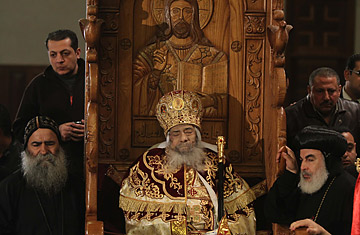
Pope Shenouda III, the spiritual leader of the Middle East's largest Christian minority, sits in state at St. Mark's Coptic Cathedral in Cairo's al-Abbasiya district on March 18, 2012. Pope Shenouda died at the age of 88
Thousands of Christian worshippers and prominent members of Egyptian society filled the somber hall of Cairo's St. Mark's Cathedral and its surrounding streets on Tuesday, March 20, for the funeral of Pope Shenouda III, the spiritual leader of Egypt's Coptic Christian community.
Shenouda died on March 17 at age 88 after presiding over the largest Christian community in the Middle East for more than four decades. He was, at times, a controversial and conservative leader, upholding the church's strict antidivorce policy and initially striving to keep Christian youths out of Cairo's Tahrir Square during last year's popular uprising.
But he enjoyed widespread popularity nonetheless, and his death comes at a critical time for Egypt's Coptic Christian minority — roughly 5% to 10% of the country's 85 million people. Egypt's Christians have grown increasingly anxious over the past year since a popular uprising toppled President Hosni Mubarak and ushered in a new government dominated by Islamists. Mubarak did little to stem religious discrimination or rising sectarian tensions over the years. But incidents of sectarian violence — typically over issues of conversion, interreligious romances and the construction of churches — have increased dramatically since the uprising, sparked in part by the rise of extremist Islamist factions and the security vacuum left by Mubarak's retreating security forces.
In October, a military crackdown on a Christian protest left 25 demonstrators dead and sparked a wave of Christian outrage as well as allegations that the country's military leaders are not merely complicit but willing participants in the sectarian violence. In January, mobs of Muslims in the village of Sharbat forced the expulsion of a few dozen of the village's Christian residents; they were angry over an alleged affair between a Christian man and a Muslim woman. Egyptian police and security forces did not intervene.
"We are very concerned," says Mark Mor'os, an unemployed Cairo engineer and one of the mourners at the Pope's funeral. "Our future without him is vague, and now we are entering the unknown." The Copts have long been treated "like children," he says: "We can't build a church without asking for permission, and if we do, then they burn it down and come with swords to cut off our ears."
"At least when Mubarak was the President, we knew who our Satan was," he adds. "Now we don't know who the next President is going to be, but we want [a Pope] who can stand in front of the next President and tell him, 'No, this [sectarian abuse] can't happen."
Egypt's first post-Mubarak presidential election is slated for June, and three of the most prominent front runners to emerge thus far are Islamists — one of them is a representative of the extremist Salafi branch of Islam, whose adherents have been blamed by Christians for recent attacks. Some Christians have predicted that they'll be forced to flee en masse, as their counterparts did in Iraq, if the sectarian crisis deepens or if Egypt's Islamist government pursues a stricter interpretation of Islamic law.
In apparent acknowledgment of growing Christian anxiety, leaders of the Islamist Muslim Brotherhood, which dominates Egypt's new parliament, joined the Coptic bishops and priests, famous actors, presidential hopefuls, military officers and foreign dignitaries for Shenouda's open-casket funeral on Tuesday. The Brotherhood and other prominent Islamists issued condolences, and the head of the ruling junta declared a nationwide state of mourning.
For two days prior, Christians had flocked to the church to view the Pope's body, which was seated upright in full regalia. The sheer volume of mourners resulted in a stampede at the cathedral on Sunday, which government officials said left three people dead. Many Christian mourners sobbed uncontrollably throughout Tuesday's funeral. As church officials struggled to carry the casket out of the cathedral at the end of the service, the push of hundreds yearning to touch the casket one last time nearly tipped it over on several occasions.
The selection of a new Pope could take months, as a council of church leaders and prominent members of the Coptic community meet to pick a worthy candidate. In the past, the Pope was chosen after influential Christians and church leaders had narrowed the possibilities to three; the names were then written on individual pieces of paper, and one was selected at random by a child. Suitable candidates have to be Egyptians by birth, be at least 50 years old and have served at least 15 years as a monk. Typically, the presiding head of the government — in this case, the head of Egypt's ruling junta — must sign off on the decision.
And for Egypt's Christians, the selection of their new spiritual leader will be awaited anxiously. "The Pope used to defend our rights, and he was the only one who stood up to the military council and asked them to stop killing our children," says Mervat Mor'os, a mourner and housewife in the poor Cairo district of Imbaba, which has seen some of the worst sectarian clashes. "The new Pope must know that he, too, has to protect us from the extremists."
— With reporting by Sharaf al-Hourani / Cairo
